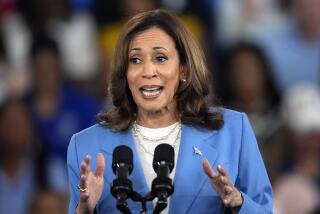Bush Promotes Spending Plan in N.H. Speech : But He Omits Budget Details; Thanks Voters for Victory in Primary
- Share via
MANCHESTER, N.H. — President Bush traveled to New Hampshire on Monday to promote the budget proposals he made last week and to thank the voters of the state that, a year ago, revived his political career after the disaster of a third-place finish in the Iowa caucuses.
“Thank you, New Hampshire,” Bush said in a speech before state business leaders, the first of three he plans to deliver this week in key Republican primary states. “It’s no coincidence,” he said, “that my very first stop is here.”
Bush used the speech to repeat the main points of his address last Thursday to a joint session of Congress, but he notably omitted one point from that text, his controversial call for a cut in capital gains taxes. Aides have raised questions about how hard the Administration will push for quick acceptance of the tax cut, which has come under sharp attack from leading Democrats.
Avoids New Ground
Bush carefully avoided breaking much new ground in Monday’s speech, particularly omitting any details of the roughly $10 billion in unspecified spending cuts that must be made if his $1.16-trillion budget is to meet deficit targets.
So far, Bush has outlined where he wants to increase spending and has set two key figures: the total for the defense budget and the overall figure for domestic spending. But he left specific program cuts to keep the domestic budget down to that spending level out of his budget formula and congressional Democrats have been loath to fill in those blanks. Budget Director Richard G. Darman met with congressional leaders in Washington on Monday in the first talks aimed at agreement on what those cuts should be.
His budget plan, Bush said, “represents a commitment to meet our national priorities and at the same time keep faith with our promise to the American people of no new taxes.”
“There are some areas in which we would all like to spend more,” he added, “but we cannot until we get our fiscal house in order and bring the federal budget deficit down.”
Plans More Speeches
Bush plans to deliver broadly similar speeches Wednesday in South Carolina, in an address to the Legislature, and Friday in Missouri, in a speech tentatively set to be delivered to students at Washington University in St. Louis.
As in New Hampshire, both states’ primaries were essential to Bush’s strategy for winning the GOP nomination last year, and all three states have strategic primaries in 1992.
New Hampshire, in particular, was key to Bush’s primary campaign last year, providing him with the victory that, as he said Monday, “gave me the chance to pick myself up off the canvas” after his loss in Iowa.
Several of Bush’s top White House aides are veterans of that primary campaign, including former New Hampshire Gov. John H. Sununu, now White House chief of staff; Sununu’s deputy, Andrew H. Card Jr., who was Bush’s New Hampshire campaign manager, and the White House operations director, J. Bonnie Newman, who formerly headed the Business and Industry Assn. of New Hampshire, the group that hosted Bush’s speech.
Bush used the speech, delivered before a friendly audience of about 1,000 conservative business leaders, to once again outline his budget priorities: education, drug fighting, increased funds for federal research efforts, environmental protection and protection for “those members of our society who are most vulnerable,” such as children, the homeless and the elderly.
And one other priority, the “no new taxes” pledge, got a visible plug in the form of five huge posters hanging behind Bush as he spoke. Each depicted a silhouette of the state of New Hampshire with the words New Taxes in a large red circle with a slash through it.
For now, however, Bush’s tax cut proposal has been getting more attention than any discussion of an imminent tax increase. The reduction of the tax on capital gains would primarily benefit wealthy taxpayers who sell assets such as stocks and bonds. Bush argues it would spur investment and thereby increase jobs.
Opponents, including such powerful Democrats as House Ways and Means Committee Chairman Dan Rostenkowski of Illinois, argue that the cut would worsen the deficit, now at $91 billion, and unfairly favor the wealthy. Any move to change tax rules now, Rostenkowski said over the weekend, would open the rest of the tax code to amendments, including proposals to increase rates for upper-income taxpayers.
Bush stopped in New Hampshire on the way back to Washington from a vacation weekend at his seaside retreat in Kennebunkport, Me.
The President later attended the formal swearing-in of Jack Kemp as the new secretary of housing and urban development. Supreme Court Justice Sandra Day O’Connor administered the oath.
References to football were frequent as Kemp, a former professional football quarterback, invited a pair of friends to join him for the ceremony--Washington Redskins coach Joe Gibbs and Gene Upshaw, president of the National Football League Players Assn.
More to Read
Get the L.A. Times Politics newsletter
Deeply reported insights into legislation, politics and policy from Sacramento, Washington and beyond. In your inbox twice per week.
You may occasionally receive promotional content from the Los Angeles Times.











